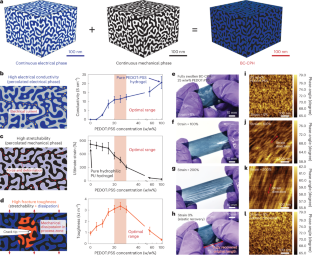ペースメーカー、人工内耳、その他の電子インプラントの電気的インターフェースとして、ゼリー状の新素材が金属に取って代わる可能性があります。 A new Jell-O-like material could replace metals as electrical interfaces for pacemakers, cochlear implants, and other electronic implants.
2023-06-05 マサチューセッツ工科大学(MIT)
◆高性能導電性ポリマーハイドロゲルの一種であり、バイオ医療機器などで金属に代わる機能的なゲル電極として使われる可能性があります。これにより、心臓や脳などの臓器との接触面が生体組織のような見た目と感触になります。
◆今後は、心臓手術の回復期に使用されることが期待されます。また、ペースメーカーや脳深部刺激装置などのより長期的なインプラントへの応用も進められています。
<関連情報>
- https://news.mit.edu/2023/mit-engineers-develop-soft-metal-free-electrode-0615
- https://www.nature.com/articles/s41563-023-01569-2
オールハイドロゲル生体電子インターフェース用の 3D 印刷可能な高性能導電性ポリマーハイドロゲル 3D printable high-performance conducting polymer hydrogel for all-hydrogel bioelectronic interfaces
Tao Zhou,Hyunwoo Yuk,Faqi Hu,Jingjing Wu,Fajuan Tian,Heejung Roh,Zequn Shen,Guoying Gu,Jingkun Xu,Baoyang Lu & Xuanhe Zhao
Nature Materials Published:15 June 2023
DOI:https://doi.org/10.1038/s41563-023-01569-2

Abstract
Owing to the unique combination of electrical conductivity and tissue-like mechanical properties, conducting polymer hydrogels have emerged as a promising candidate for bioelectronic interfacing with biological systems. However, despite the recent advances, the development of hydrogels with both excellent electrical and mechanical properties in physiological environments is still challenging. Here we report a bi-continuous conducting polymer hydrogel that simultaneously achieves high electrical conductivity (over 11 S cm-1), stretchability (over 400%) and fracture toughness (over 3,300 J m-2) in physiological environments and is readily applicable to advanced fabrication methods including 3D printing. Enabled by these properties, we further demonstrate multi-material 3D printing of monolithic all-hydrogel bioelectronic interfaces for long-term electrophysiological recording and stimulation of various organs in rat models.


